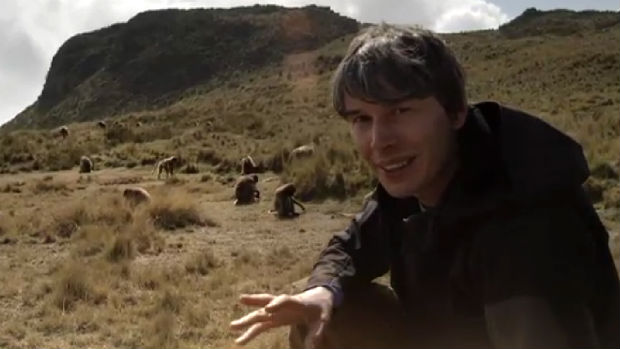Human Universe: the ascent of man – and Brian Cox, of course
New BBC2 science series gets better when David Attenborough's anointed heir comes down to earth

A free daily email with the biggest news stories of the day – and the best features from TheWeek.com
You are now subscribed
Your newsletter sign-up was successful
Viewers who have not yet succumbed to the soft-voiced charms of Brian Cox – and I counted myself among their dwindling number until this week – will find little in the opening sequence of his new BBC2 series, Human Universe, to bring them into the fold.
We join him 250 miles above the Earth's surface, or so it seems, as he drifts through space and burbles at the wonder of it all, like a blissed-out Lancastrian Sandra Bullock.
The stunt fuels a suspicion that Cox is, to put it politely, not overly troubled by self-doubt – even if he's not actually in space, but at a training facility on the outskirts of Moscow.
The Week
Escape your echo chamber. Get the facts behind the news, plus analysis from multiple perspectives.

Sign up for The Week's Free Newsletters
From our morning news briefing to a weekly Good News Newsletter, get the best of The Week delivered directly to your inbox.
From our morning news briefing to a weekly Good News Newsletter, get the best of The Week delivered directly to your inbox.
And when he turns up in Ethiopia amid a troop of baboons, crouching among them to deliver his piece to camera, the echo of another encounter with another species of primate three decades ago seems almost impertinent – even if David Attenborough has since anointed Cox as his chosen heir.
Perhaps the young professor is not entirely to blame. In a recent interview he confessed that the final edit of an earlier series, Wonders of the Universe, was not to his liking. It was "not doing what I thought it should", he said. "It was a lot of me walking on my own in landscapes".
It was directionless in other ways too. Forced to deal with highly abstract concepts – entropy, for example – Cox resorted too often to rhetorical flights of fancy.
Human Universe is, by contrast, more deeply rooted in the world of concrete things, and propelled by a tauter narrative.
A free daily email with the biggest news stories of the day – and the best features from TheWeek.com

Episode one, for example, sets out to explain the ascent of the human species, from apeman to spaceman. How, it asks, did we acquire the knowledge and skill to build the International Space Station, while the baboons remained earthbound on the Ethiopian plains?
It's ambitious, certainly, but also accessible: compared with the theory of universal heat death, the rise of humankind can more easily be related through artefacts. Cox's enthusiasm is therefore projected onto tangible representations of his subject, rather than his own interpretations of it.
The result is that his linguistic flourishes are grounded in the familiar physical world. When he holds up a prehistoric arrowhead fashioned from obsidian and describes it as "the earliest evidence of minds that think like ours", he draws a line that connects us with the very stirrings of civilisation.
The journey from that moment to the space age leads us from simple science to sophisticated ideas. From the basic concept of seasonal variation, Cox glides on to more subtle deviations in the Earth's trajectory through space, and then to their effect on the climate of East Africa's Great Rift Valley, and then why that led to the evolution of Homo sapiens…
Despite its pace and pitch, the programme is not restless. Having ranged through time, space and intellectual history, it settles and dwells on critical ideas – the rise of cooperative social groups, for example, or the development of written language.
Seen from this distant perspective, the story of human history is rousingly optimistic. As individuals we may struggle from day to day, or as societies from decade to decade, yet still we take our place in our species' grand procession towards enlightenment.
If there's a whiff of narcissism about both the subject matter of Human Universe and its presenter, that can be forgiven. How we gained awareness of our selves and our world is a compelling story, and it's told here with verve and delight.
Human Universe continues next Tuesday, BBC2, 9pm.
Holden Frith is The Week’s digital director. He also makes regular appearances on “The Week Unwrapped”, speaking about subjects as diverse as vaccine development and bionic bomb-sniffing locusts. He joined The Week in 2013, spending five years editing the magazine’s website. Before that, he was deputy digital editor at The Sunday Times. He has also been TheTimes.co.uk’s technology editor and the launch editor of Wired magazine’s UK website. Holden has worked in journalism for nearly two decades, having started his professional career while completing an English literature degree at Cambridge University. He followed that with a master’s degree in journalism from Northwestern University in Chicago. A keen photographer, he also writes travel features whenever he gets the chance.